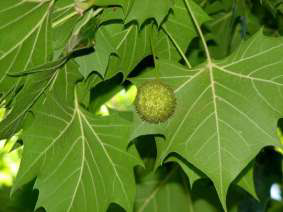 American Sycamore
American Sycamore
(Platanus occidentalis)
|
Classification |
| Kingdom: |
Plantae |
| Division: |
Magnoliophyta |
| Class: |
Magnoliopsida |
| Order: |
Proteales |
| Family: |
Platanaceae |
| Genus: |
Platanus |
| Species: |
P. occidentalis |
Habitat: American Sycamore prefers the wet soils of stream banks, flood plains, and edges of lakes and swamps, and is a dominant species in mixed forests.
Range: American Sycamore can be found from Maine south to Florida, over to central Texas and north to Nebraska.
Native American Uses: The Sycamore was used by Native Americans as an anti-diarrheal, a cathartic, and to induce abortions. In addition, it was used as a cough medicine, a dermatological aid, an emetic, a gastrointestinal aid, and as a urinary aid. The wood was also used for buildings and crafts. Groups that utilized the American Sycamore included the Cherokee and the Delaware Indians.
Colonial Uses: The sap from the Sycamore was drunk like water and contains small concentrations of sugar. The sap can be boiled down to produce syrup.
Modern Uses: Today, the wood is used for furniture parts, millwork, flooring, and specialty products such as butcher blocks, as well as pulpwood, particle board and fiberboard. The Sycamore has also been planted as a shade tree because of its broad spreading crown.